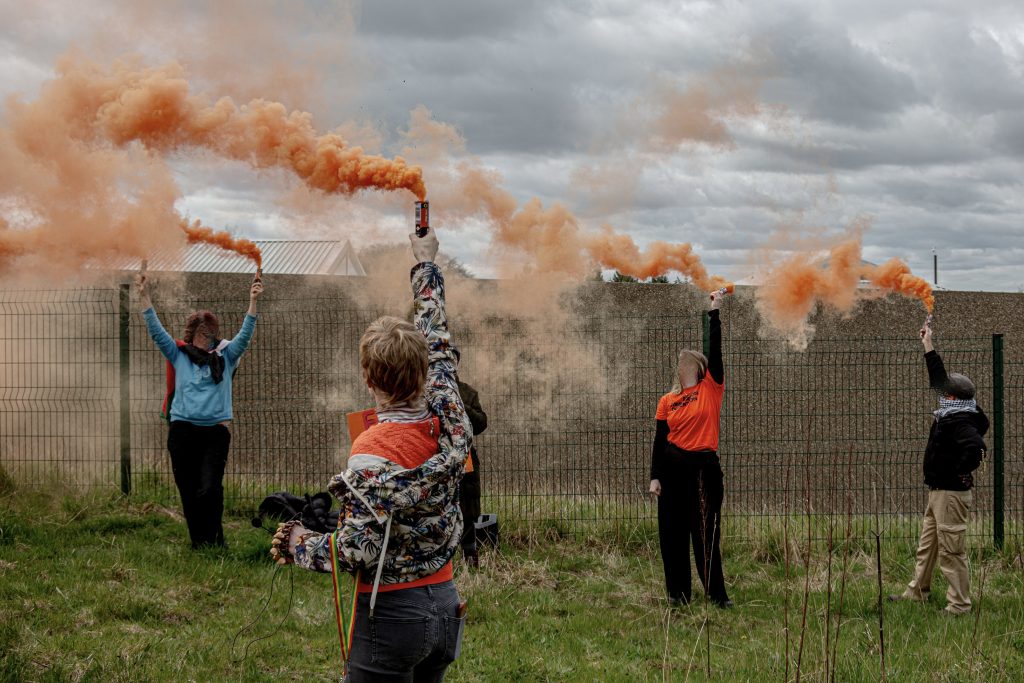
Last week on October 2nd, over 70 people from groups and organisations across the country joined the Right to Remain online rally against detention.
The event was to support the upcoming national demonstration against detention on October 19th, and the campaign to end detention.
An introduction to detention, from an expert
The opening session began with an introduction to detention, a reminder of why we are here, and an impassioned call to action from These Walls Must Fall campaigner Mavis Harrison.
Mavis spoke of her experience in Yarl’s Wood detention centre in 2011, “the most difficult time of my life”, when she was detained for over seven months. Recounting the fear, the mistreatment, the lack of care for the vulnerable or sick, the retraumatising of survivors of violence and abuse, the lack of a time limit or release date, Mavis said the constantly distressing conditions were “deeply dehumanising”.

Relating how she still bears the scars of these experiences, Mavis told the meeting that she is determined to keep up the fight to abolish immigration detention, so that other people do not have to go through what she and so many others have experienced. “This is why this campaign is so important, this is why these walls must fall”.
Refugee Women Connect: we need solidarity
Our second speaker was Comfort Etim, Director of Refugee Women Connect, a charity based in Liverpool working with women asylum seekers, refugees and survivors of trafficking.
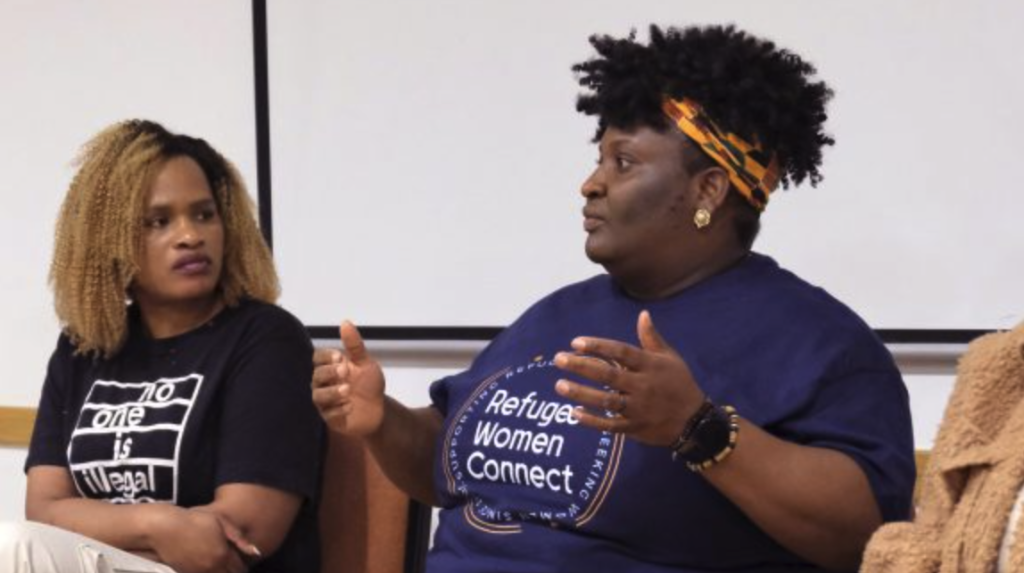
Comfort spoke from direct experience of detention too, describing how it isolates people, deliberately, from friends, family and support, and from legal representation. And when people are released, they return to the community damaged – “the trauma never really leaves you”. People are in need of help and support that isn’t always available. Week after week, Refugee Women Connect work with hundreds of women who are living with the trauma of detention, with ongoing mental ill-health, and living in fear that it could happen again at any moment.
Comfort concluded with a call to action and a reminder of the importance of centering lived-experience in the campaign, while stressing the need for extra care and support for survivors of detention:
“We have to come together now in solidarity… and we need to speak up as people with lived experience. I don’t think they (the politicians) understand the trauma that has been caused to us”
Visitors to detention: a view from AVID
Our third speaker was Gee Manoharan of AVID, the Association of Visitors to Immigration Detainees. For 30 years, AVID has acted as a network for groups visiting people in detention, providing help and support.
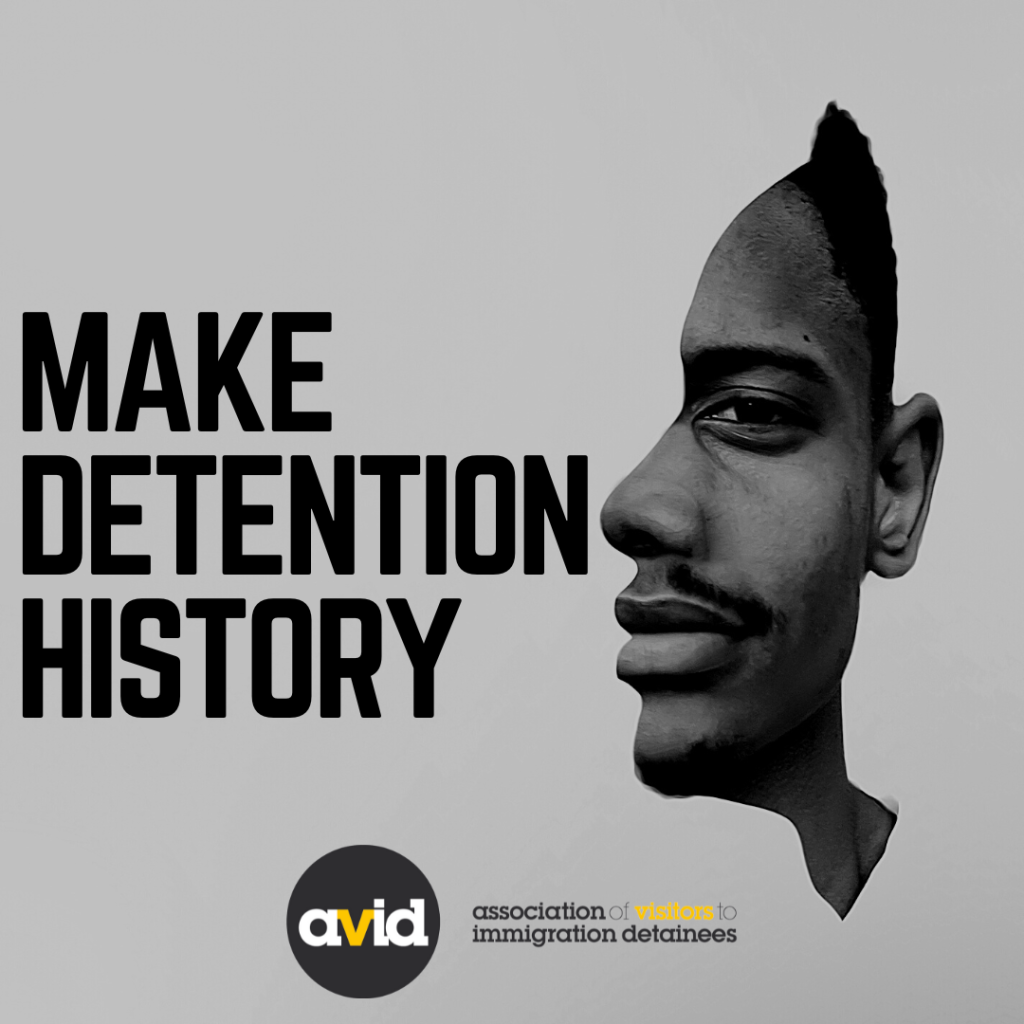
Speaking from Birmingham, Gee quoted from the late Benjamin Zephaniah’s poem “People always need people”, and said that we should see this online rally, and upcoming demonstration, as a way to build a real movement for real change; an opportunity for connections, actions, and relentless determination like the No to Hassockfield campaign. A movement centering lived experience: people who are living proof of the harm of the system, but more than just our stories. A movement for liberation, for abolition not reform.
Coalition to keep Campsfield Closed
Following Gee was Bill MacKeith of the Coalition to Keep Campsfield Closed. Bill has been involved in anti-detention campaigning since before Campsfield House opened in 1993, the first purpose-built, privately-run immigration detention centre in Britain.
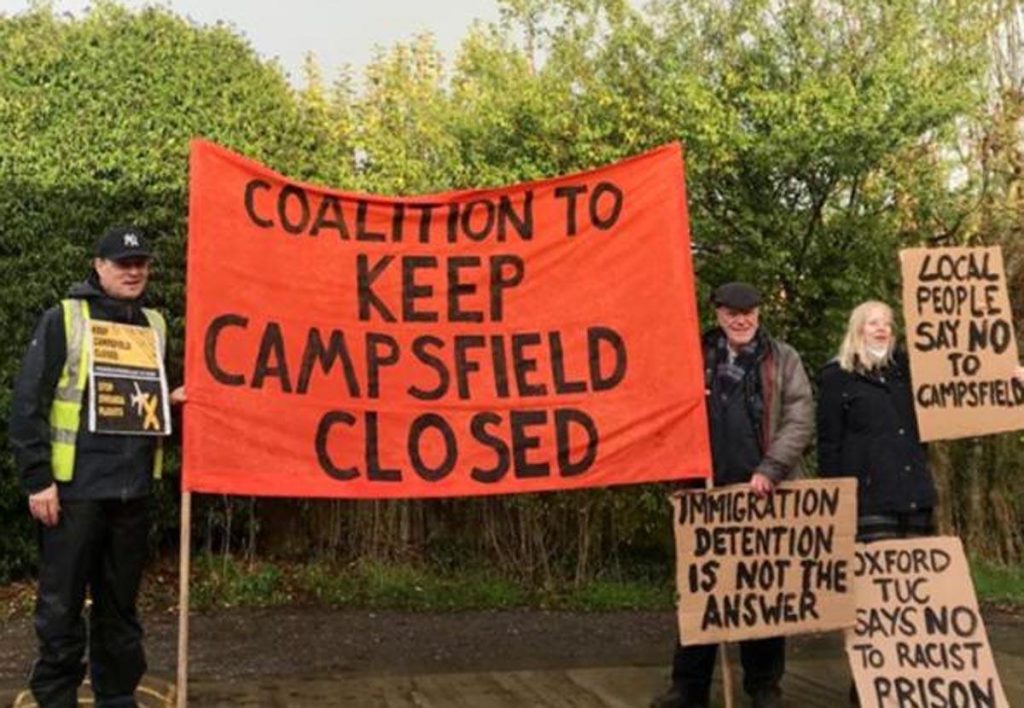
Bill described how Campsfield was closed in 2018 after years of campaigning and advocacy forced the Conservative government to change policy, promising to detain fewer people, for shorter periods, and leading to the closure of four detention centres. Sadly, the 2019 Conservative government reversed this policy, announcing that Campsfield and Haslar detention centres would be reopened and expanded as part of the Rwanda plan.
With the Rwanda plan ditched, the priority for the Campsfield campaign now is to stop the detention expansion plans, working locally and nationally as part of the campaign to end immigration detention. Speaking from long experience of this movement, Bill said he was energised and hopeful at this moment, which could be a turning point in the campaign to end detention.
Challenging the causes of destitution and detention
The next speaker was Leon Elliot from Naccom, the No Accommodation network. Leon drew attention to the thousands of people who have been refused asylum, highlighting the 2023 Naccom research report Refused? Experiences following a negative asylum decision.
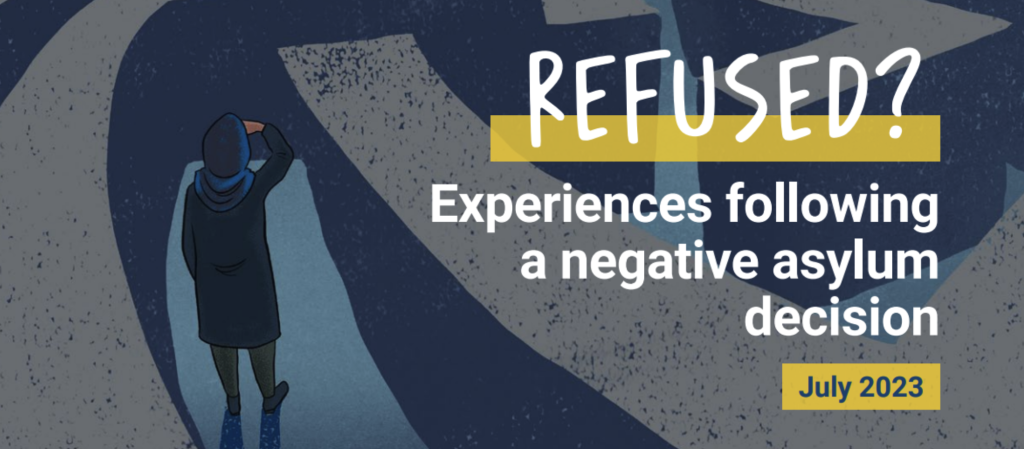
The report provides a vital insight into the human impact of poor and ineffective asylum decision-making, the “systemic and practical barriers” to justice that lead to refusal of asylum, homelessness and the threat of detention and deportation.
Leon commented that the Labour government promised to bring fairness to the asylum system, but has fallen short, seemingly determined to continue with the enforcement plans of the previous government. he ended by saying that Naccom works towards ending the hostile environment that leads to destitution, which will require so many changes, and that ending detention would be a significant step forward. And right now we should be asking whether there should be an immediate stop to the detention and deportation of those failed by the system.
Our stories are powerful, but they do not define us
Our final guest speaker was Kolbassia Haoussou, Survivor Leadership and Influencing Director at Freedom from Torture. Kolbassia described the impact of suddenly having his freedom taken away, to have no choice, no agency, feeling disempowered. Having survived this experience, it has been his mission to help bring more people with lived experience into active involvement in working for change.
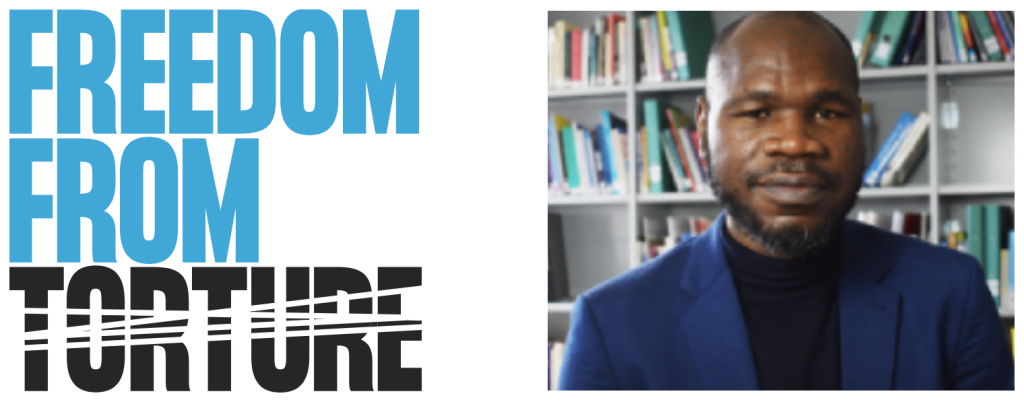
Addressing people with lived experience who want to speak out and get involved, Kolbassia said that we do not need to let our stories shape us in a negative way, we can use our experience in a positive way, use that power to help shape the future. For organisations and groups seeking to support lived experience in changemaking, Kolbassia called for more investment in time and resources to support full involvement of people with expert experience of the system we are trying to change.
This brief overview of the guest speakers’ panel doesn’t do justice to their powerful and inspiring interventions in this rally. Massive thanks to all the speakers.
Strategies and tactics
Following the panel, the rally broke into three smaller meetings: demonstrations, resisting detention expansion plans, and centering lived experience. This was an opportunity to focus on some important aspects of the campaign, to make connections and exchange ideas.
Lively and interesting discussions were reported back from each group, which all had at least one theme in common: this is just the beginning, or at least the beginning of a new stage; we need more connections, more exchanges, more action.
Support the national demonstration – even if you can’t get there!
Coming back together, the meeting heard an update from the organising team for the Hassockfield/Derwentside demonstration on October 19th. With coaches bringing people from Durham, Newcastle, Sunderland, Sheffield, Manchester and Liverpool to join local campaigners, this promises to be the biggest demonstration at a detention centre for years.
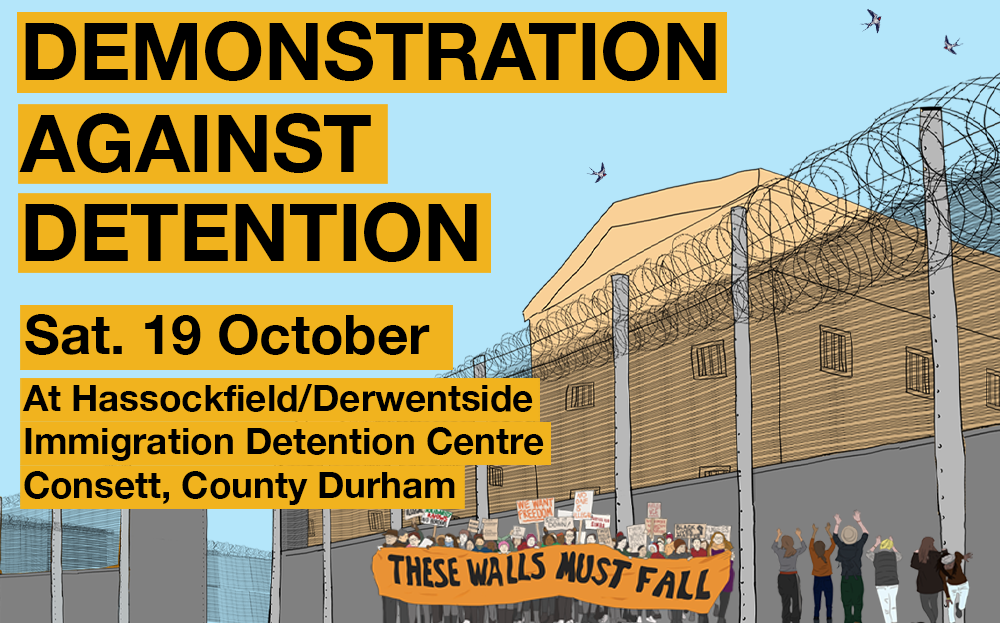
If you can make it, please join us on the day. If you can’t be there, maybe you can help others to attend by donating to the transport fundraiser. And please help to spread the word in your networks, on social media, at your community centre, place of worship, your workplace or trade union branch, to the person next to you in the supermarket queue :-)
Let’s get organised, and build on this demonstration to grow the movement for migration justice. Together we can bring down the hostile environment, together we can bring down the walls.
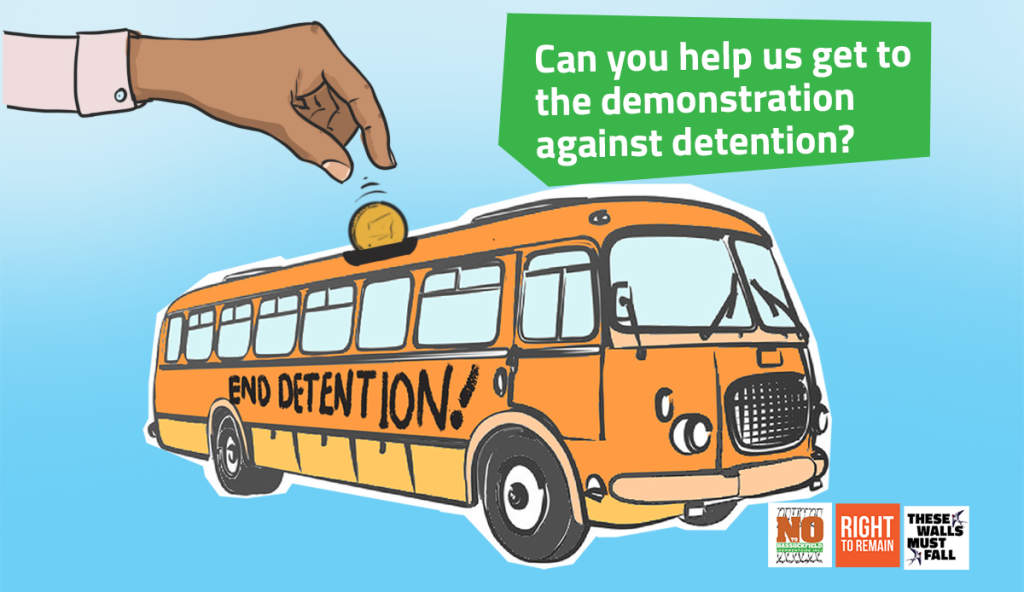
















Discussion: